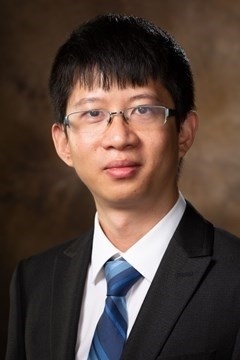The National Science Foundation awarded Lu Zhang, assistant professor of computer science and computer engineering at the U of A, with a prestigious Faculty Early Career Development award to support his research on long-term fairness in sequential decision making.
The five-year, $597,185 award will be used to support Zhang’s research on fair machine learning. Machine learning refers to the use and development of computer systems that can learn and adapt without following explicit instructions by using algorithms and statistical models to analyze and make automatic decisions from data patterns.
Zhang will use machine-learning techniques to model how data is influenced by decisions in nature. Then he will study how this influence could lead to fair consequences by changing the decision-making strategy.
In his proposal, Zhang notes that “ensuring fairness for each single decision does not guarantee fairness in the long-term, presenting a challenging and urgent problem to the fair machine-learning community about achieving long-term fairness.”
Zhang uses the example of a bank giving a loan to show how sequential decision making can impact long-term fairness. If a bank awards a loan at an assigned interest rate, that can affect the recipient’s risk of default and lower their credit score, impacting their next loan application in turn.
“If the bank’s decision leads to a long-term decrease in the credit score then it imposes a long-term negative effect on future decisions of this person,” Zhang noted.
In this case, the goal is to ensure the model initially used by the bank would not lead to unfair consequences, such as relying on historical data with bias built into it. Other areas where sequential decision making may lead to long-term unfairness might be in job applications or college admissions.
Ultimately, Zhang hopes his work will help companies, organizations and individuals better understand the benefits and risks of using machine learning in decision making, identify whether their use imposes unfair consequences on certain groups of people, and improve domain users’ ability to comply with fairness-related regulations.
To achieve this, Zhang will utilize Pearl's Structural Causal Model, a mathematical framework that provides a general and formal calculus for analyzing causal effects from observational data. He intends to propose universal formulations for measuring long-term fairness, develop learning algorithms for building fair decision models in both offline and online learning settings, and study extensions to complicated real-world situations.
“This project will make a transformative change to fair machine learning by greatly advancing the understanding of fundamental issues of fairness in dynamic settings,” Zhang said, “shedding light on the path to addressing conflicts between inconsistent fairness concepts and contributing to the limited base of knowledge in long-term fair machine learning which is imperative for many real-world applications.”
CAREER awards are the NSF's most prestigious award for early career faculty who have the potential to serve as academic role models in research and education and to lead advances in their department or organization. The awards are for five years and include teaching and public-outreach components. This award will help lay the foundation of Zhang’s career.
This is Zhang’s second grant from the NSF as principal investigator. In October of 2021, he was awarded a $484,828 grant from the NSF’s division of Information and Intelligent Systems to support his research, "III: Small: Counterfactually Fair Machine Learning through Causal Modeling." The goal of that research was to reduce discrimination during intelligent machine learning in static systems. This CAREER award extends his previous research to the more important long-term consequences of machine-automated decisions.
About the University of Arkansas: As Arkansas' flagship institution, the U of A provides an internationally competitive education in more than 200 academic programs. Founded in 1871, the U of A contributes more than $2.2 billion to Arkansas’ economy through the teaching of new knowledge and skills, entrepreneurship and job development, discovery through research and creative activity while also providing training for professional disciplines. The Carnegie Foundation classifies the U of A among the few U.S. colleges and universities with the highest level of research activity. U.S. News & World Report ranks the U of A among the top public universities in the nation. See how the U of A works to build a better world at Arkansas Research News.
Topics
Contacts
Lu Zhang, assistant professor
Department of Computer Science and Computer Engineering
479-575-4382, lz006@uark.edu
Hardin Young, assistant director of research communications
University Relations
479-575-6850,
hyoung@uark.edu
